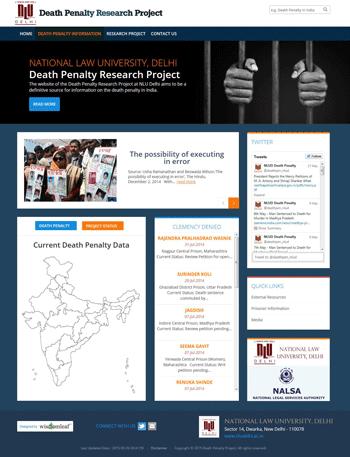The Death Penalty Research Project
The Death Penalty Research Project is being carried out by National Law University, Delhi in collaboration with the National Legal Services Authority (NALSA), and was approved by Honourable Justice Sathasivam in his capacity as the Executive Chairman of NALSA. The Project seeks to create a socioeconomic profile of death row prisoners across India as well as map their interaction with the criminal justice system at different levels. The project, spearheaded by Dr. Anup Surendranath (Director) and Ms. Neha Singhal (Deputy Director), comprises over fifty researchers and seeks to achieve a deeper understanding of how the socioeconomic background of these prisoners influences their access to the criminal justice system, and how the system itself impoverishes those who seek access to it.
Given the tremendous social and economic disparity in our country, the criminal justice system, with its deeply entrenched systemic flaws such as investigative arbitrariness, multiple ‘getaways’, inordinate delay during trial, and the all pervasive, capricious element of chance, impoverishes the already impoverished. It is a matter of serious interrogation as to whether our criminal justice system can be relied upon to mete out a sentence of such a grave nature, not only in terms of the enormous impact it has on the psyche of the condemned prisoner, but in terms of the financial and social implications of the sentence on the families of the prisoner.
The project seeks to achieve an understanding not only of the extent of the impact of the sentence on the prisoner and his family, but also the various factors impinging upon his access to justice, which include but are not limited to his socioeconomic condition, through interviews with the prisoners, their families and their trial court lawyers. The project also entails analyzing judgments so as to ascertain whether judicial practices reflect the change in legal philosophy on sentencing. The Supreme Court of India in Bachan Singh v. State of Punjab and Santosh Kumar Bariyar v. State of Maharashtra has lamented the lack of empirical research on the death penalty in India. The Death Penalty Research project aims at filling that gap by tracing the journey of the convict through the bewildering labyrinth of the criminal justice system, including the difficulty in accessing legal aid as well as the consequences of its structural limitations.
The project, which commenced in June 2013, is expected to culminate in a report that will be published by August 2014. So far nearly 300 prisoners, their families and lawyers have been interviewed in the states of Uttar Pradesh, Bihar, Karnataka, Kerala, Madhya Pradesh, Gujarat, Delhi, West Bengal, Assam, Punjab, Haryana and Rajasthan
The current student coordinator of the project is CV Aradhana and the former student coordinators are Ishita Sharma and Devansh Arya. |



